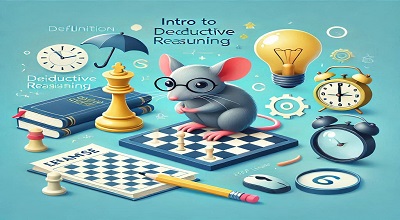Deductive Reasoning
Introduction to deductive reasoning involves understanding the process of concluding by logically applying general principles or premises to specific situations. It’s a fundamental aspect of logical thinking and forms the basis of mathematical proofs, scientific hypotheses, and legal arguments.
Here’s a breakdown of the steps involved in deductive reasoning:
- Start with a premise: Begin with a statement or set of statements that serve as the foundation for your reasoning. These premises are assumed to be true.
- Apply logical rules: Use rules of inference, such as modus ponens, modus tollens, hypothetical syllogism, etc., to derive new conclusions from the premises.
- Conclude: By applying logical rules, deduce a specific conclusion that logically follows from the premises.
Examples of deductive reasoning:
- Premise: All humans are mortal.
- Premise: Socrates is a human.
- Conclusion: Therefore, Socrates is mortal.
This example starts with the general premise that all humans are mortal. We then apply this premise to the specific case of Socrates, a human, and deduce that he must also be mortal.
- Premise: If it’s raining, then the ground is wet.
- Premise: It’s raining.
- Conclusion: Therefore, the ground is wet.
Here, we have a conditional statement (if…then) as our premise. Given that it’s raining (which is true according to the premise), we can logically deduce that the ground must be wet based on the conditional relationship.
- Premise: Every A is B.
- Premise: X is an A.
- Conclusion: Therefore, X is B.
This is a general form of deductive reasoning where a categorical statement is made about a group (in this case, “A”) and then applied to a specific member (“X”) of that group to conclude it.
Conclusion
In each of these examples, the conclusions logically follow from the premises through the application of deductive reasoning principles.
